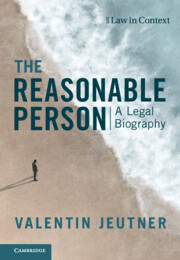Book contents
- The Reasonable Person
- Law in Context
- The Reasonable Person
- Copyright page
- Dedication
- Contents
- Acknowledgements
- Table of Cases
- Table of Legislation
- Introduction
- 1 The Reasonable Person in the Past
- 2 The Reasonable Person in Birmingham
- 3 The Reasonable Person in Clapham
- 4 The Reasonable Person in the Colonies
- 5 The Reasonable Person on the Battlefield
- 6 The Reasonable Person in the Future
- Conclusion
- Bibliography
- Index
2 - The Reasonable Person in Birmingham
Published online by Cambridge University Press: 30 May 2024
- The Reasonable Person
- Law in Context
- The Reasonable Person
- Copyright page
- Dedication
- Contents
- Acknowledgements
- Table of Cases
- Table of Legislation
- Introduction
- 1 The Reasonable Person in the Past
- 2 The Reasonable Person in Birmingham
- 3 The Reasonable Person in Clapham
- 4 The Reasonable Person in the Colonies
- 5 The Reasonable Person on the Battlefield
- 6 The Reasonable Person in the Future
- Conclusion
- Bibliography
- Index
Summary
Chapter 2 focuses on the emergence of the modern concept of the reasonable person in nineteenth-century Britain. It argues that this development resulted from the legal and economic needs of the industrial revolution and was informed by the metaphysics of the Scottish sentimental Enlightenment. The chapter’s point of departure is the case known as Blyth v The Company of Proprietors of the Birmingham Waterworks, one of the first cases to discuss explicitly modern law’s reasonable person. Distinguishing between a rational Enlightenment and a sentimental Enlightenment, the chapter then shows that the underlying rationale of the reasonable person relies heavily on the sentimental Enlightenment, namely on David Hume’s and Adam Smith’s thought on the importance of empathy, judgement making in relation to the feelings of others, the incomplete understanding of morality that can be gained from objective reason, and the importance of a human common sense. The third section explains how the industrial revolution and the sentimental Enlightenment influenced the life of Baron Alderson, the judge who oversaw Mr Blyth’s case against the Birmingham Waterworks.
Keywords
- Type
- Chapter
- Information
- The Reasonable PersonA Legal Biography, pp. 33 - 58Publisher: Cambridge University PressPrint publication year: 2024

